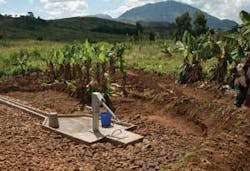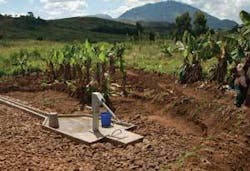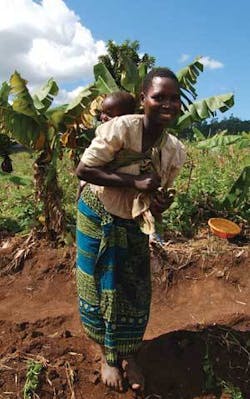Malawi’s Ntenje Shallow Well Project
An existing or newly hand-dug water source, bricks and concrete, a small amount of piping and simple Afridev hand pump made with local parts, that’s properly sited and sealed with a protective cover can offer safe water year-round. Since they’re built largely by local labor - with special aid from Water For People partners - and maintained by local water committees, they’re a cost-effective tool to fight waterborne diseases. Yet despite low cost, Malawi’s rural farming villages often can’t afford these shallow wells.
In the developed world, being chased by a hyena and falsely accused of infidelity by a jealous husband might seem like material for a bad sitcom. But in rural Malawi - a central African nation bordered by Zambia, Tanzania and Mozambique - it’s a different story. In fact, it’s Rufina Ching’anda’s story, and it’s true.
Rufina lives in the farming village of Ntenje with her husband and 2-year-old son. Ntenje is in southern Malawi, west of Blantyre, the country’s main commercial center.
Like other women in her village, and in rural villages globally, Rufina bears the duty for providing water to her family. Before Water For People and its partner organization, Hygiene Village Project, helped the community construct a shallow well, Rufina spent up to two-thirds of her waking hours finding, hauling and distributing water. This isn’t uncommon in the developing world, and it effectively excludes women from education and income generation, cuts deeply into their ability to properly care for their children, puts most social activities beyond reach, and can adversely affect their health.
To make matters worse, hard-earned water is rarely safe for drinking. In Rufina’s village, an unprotected well from which she drew water was contaminated by surface pollution and was the source of chronic diarrhea and other water-related illnesses afflicting the community. Although never truly safe, the well water was at least cleaner early in the day before the rest of the villagers stirred up the sediment in efforts to collect water.
Because of that and the fact the well often dried up by noon, Rufina would wake between 4 and 5 a.m. to begin her grueling work. One morning on her way to the well, an animal that appeared to be a hyena chased her. Frightened, she changed her schedule and began gathering water later in the day. After hearing her story, other village women changed their routines, too, and soon everyone was collecting water at a later time.
The result - a human traffic jam at the well with long lines and more time required to obtain a few buckets of cloudy, dirt-colored water. With Rufina gone from home for even longer periods, her husband began to suspect she was having an affair. Her fear of attack by a hyena was now coupled with fear of losing her marriage. This brought still another change to Rufina’s water-gathering habits.
To avoid the long wait as the water slowly filtered up to be gathered, she started collecting only a bucket of drinking water a day at the well, supplementing it with even less safe river water for bathing and other household purposes. At times, she wasn’t sure which bucket came from the well and which from the river - and although she understood the importance of boiling the water, she often didn’t have time for this. Soon her son became ill with diarrhea and what little money the family had was spent on medicine.
That scenario would likely be continuing today were it not for the Ntenje Shallow Well Project initiated by Water For People and its in-country partners. As part of the project, the existing well was deepened and lined with brick, then fitted with a hand pump. This relatively simple but highly effective method for increasing capacity of the well and improving access to safe water transformed life for Ntenje’s residents.
Long-term benefits of shallow wells are sustained by initial and ongoing education that link protected water and health. The Water For People project will ultimately include five wells, reaching 2,635 people at a cost of $11,000.
For Rufina, the protected well means she can meet her family’s needs for safe water any time of the day. As a result, her son is healthier and she’s free from the fears of wild animals … and a husband with an overly active imagination.
Author’s Note:
Kate Harawa is country coordinator in Malawi for Water For People, a Denver, Colorado, USA-based non-governmental organization since 1991 with water and sanitation programs in Bolivia, Honduras, Guatemala, Malawi and India. Contact: 303-734-3490 or www.waterforpeople.org
Plotting the Future
A Water For People mapping initiative this year is assessing needs for future water and sanitation efforts by marking area water points at all project sites and their operational status on a GPS system. Coordinated by local NGOs and government partners, its Denver staff, and volunteers in its new Water Corps program, mapping trips are planned in Malawi (August), Bolivia (September), and India (November). Volunteers can apply on the WFP website.


